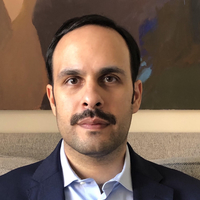Talal Al-Rashoud
Kuwait University, History, Faculty Member
- Talal Al-Rashoud is an Assistant Professor of Modern Arab history at Kuwait University. He obtained his PhD in history from the School of Oriental and African Studies (SOAS), and holds master’s degrees in history and government from King’s College London and Georgetown University respectively. Al-Rashoud specialises in the history of modern ideological mo... moreTalal Al-Rashoud is an Assistant Professor of Modern Arab history at Kuwait University. He obtained his PhD in history from the School of Oriental and African Studies (SOAS), and holds master’s degrees in history and government from King’s College London and Georgetown University respectively. Al-Rashoud specialises in the history of modern ideological movements in the Gulf region and their transnational connections, as well as the history of modern education in the Gulf.edit
This paper explores the development of Kuwait’s scholarship program for Arab students from its inception in 1953 to the country’s independence in 1961, a period when Arab nationalist influence dominated the Kuwaiti Educational Department.... more
This paper explores the development of Kuwait’s scholarship program for Arab students from its inception in 1953 to the country’s independence in 1961, a period when Arab nationalist influence dominated the Kuwaiti Educational Department. The ‘Arab Scholarships’, as they were known, brought students from Arab countries suffering from underdevelopment and/or colonial repression to study in Kuwaiti schools at primary, intermediate, and secondary levels. Most came from the Arabian Gulf, the Maghreb, and Southern Arabia, with smaller numbers from East Africa and Palestine.
It is argued that Kuwait’s Arab Scholarship program was motivated largely by Pan-Arab ideals and shaped by interpersonal networks linking Kuwaiti educators and officials to Arab nationalist activists throughout the region. The department granted scholarships to both governments and anti-colonial groups. These organizations capitalized on the presence of their students in Kuwait to branch out into other activities, contributing to the country’s emergence as a regional hub for political activism.
It is argued that Kuwait’s Arab Scholarship program was motivated largely by Pan-Arab ideals and shaped by interpersonal networks linking Kuwaiti educators and officials to Arab nationalist activists throughout the region. The department granted scholarships to both governments and anti-colonial groups. These organizations capitalized on the presence of their students in Kuwait to branch out into other activities, contributing to the country’s emergence as a regional hub for political activism.
